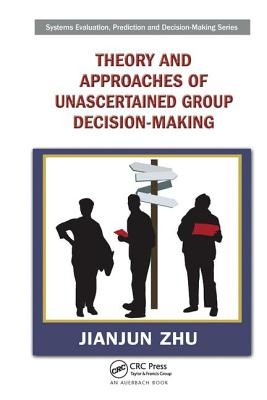
- We will send in 10–14 business days.
- Author: Jianjun Zhu
- Publisher: Auerbach Publications
- ISBN-10: 1138198986
- ISBN-13: 9781138198982
- Format: 15.6 x 23.4 x 1.4 cm, softcover
- Language: English
- SAVE -10% with code: EXTRA
Theory and Approaches of Unascertained Group Decision-Making (e-book) (used book) | bookbook.eu
Reviews
Description
Tackling the question of how to effectively aggregate uncertain preference information in multiple structures given by decision-making groups, Theory and Approaches of Unascertained Group Decision-Making focuses on group aggregation methods based on uncertainty preference information. It expresses the complexity existing in each group decision-making process by employing complex networks and studying various methods of aggregating preference information from various unascertained, time-series based decision-making groups' structures.
Written by Jianjun Zhu, director of the Chinese Society for Optimization, Overall Planning, and Economic Mathematics, the book starts by examining case studies of group decision making. It discusses consistency measuring and ranking methods of interval number reciprocal judgment matrix and interval number complementary judgment matrix. Next, it presents an unascertained number preference and a three-point interval number preference.
Investigating linguistic preferences, the text provides two consistencies definitions. It considers the aggregating methods of several uncertain preferences as well as the multistage aggregating model of uncertain preference. The final chapter proposes an aggregating model of multistage linguistic information based on TOPSIS.
The research in this book is supported by a number of scientific foundations from the People's Republic of China, including the National Natural Science Foundation of China; the Social Science Foundation of China, Jiangsu Province; and the Soft Science Foundation of China.
EXTRA 10 % discount with code: EXTRA
The promotion ends in 18d.20:11:21
The discount code is valid when purchasing from 10 €. Discounts do not stack.
- Author: Jianjun Zhu
- Publisher: Auerbach Publications
- ISBN-10: 1138198986
- ISBN-13: 9781138198982
- Format: 15.6 x 23.4 x 1.4 cm, softcover
- Language: English English
Tackling the question of how to effectively aggregate uncertain preference information in multiple structures given by decision-making groups, Theory and Approaches of Unascertained Group Decision-Making focuses on group aggregation methods based on uncertainty preference information. It expresses the complexity existing in each group decision-making process by employing complex networks and studying various methods of aggregating preference information from various unascertained, time-series based decision-making groups' structures.
Written by Jianjun Zhu, director of the Chinese Society for Optimization, Overall Planning, and Economic Mathematics, the book starts by examining case studies of group decision making. It discusses consistency measuring and ranking methods of interval number reciprocal judgment matrix and interval number complementary judgment matrix. Next, it presents an unascertained number preference and a three-point interval number preference.
Investigating linguistic preferences, the text provides two consistencies definitions. It considers the aggregating methods of several uncertain preferences as well as the multistage aggregating model of uncertain preference. The final chapter proposes an aggregating model of multistage linguistic information based on TOPSIS.
The research in this book is supported by a number of scientific foundations from the People's Republic of China, including the National Natural Science Foundation of China; the Social Science Foundation of China, Jiangsu Province; and the Soft Science Foundation of China.


Reviews